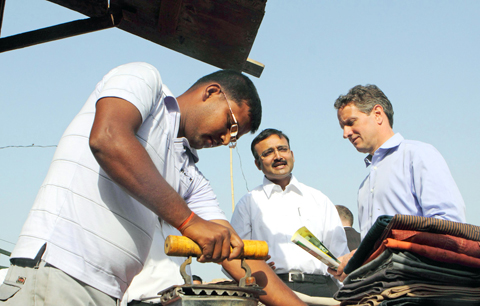US Treasury Secretary Timothy Geithner met Indian Prime Minister Manmohan Singh in New Delhi yesterday for talks to boost ties that are often eclipsed by Washington’s trade with China.
Geithner, beginning a two-day maiden visit as treasury secretary to India, is focusing on enhancing trade and investment with the surging economy and improving global financial stability.
Geithner met Singh for half an hour, an Indian official said, and was later meeting Indian Finance Minister Pranab Mukherjee to press India to open up its highly regulated markets to US investment.

PHOTO: BLOOMBERG
Washington says freer Indian markets could give the emerging nation cheaper access to capital to finance the billions of dollars needed to overhaul its dilapidated infrastructure, seen as a restraint to higher economic growth.
“We have a huge mutual stake in closer economic ties,” said Geithner, who is accompanied by other senior treasury officials and US Federal Reserve Vice Chairman Donald Kohn.
Geithner was in New Delhi to help formally launch the new US-India Economic and Financial Partnership as he promotes a long-term strategy to give India more parity with China in the US trade mindset.
The project, announced in November by US President Barack Obama during a visit by Singh to Washington, will spur regular Cabinet-level meetings in line with a similar dialogue between the US and China.
Geithner, who spent part of his childhood in India when his father worked for the Ford Foundation, said he also wanted “to build a much stronger cooperative partnership with India on broader global financial issues.”
He said he was keen to talk to Indian policymakers about tightening global standards for controlling risk as markets become more integrated in the wake of the worldwide financial crisis.
“Naturally when we’re holding discussions before the spring meetings of the IMF, World Bank and G20, all those issues will come up,” Mukherjee said.
Bilateral relations have blossomed after years of Cold War mistrust, Indian unease about close US ties with Pakistan and Washington’s displeasure over New Delhi’s acquisition of a nuclear bomb.
Last month, the two countries signed a trade and investment cooperation framework which US Trade Representative Ron Kirk said would tap the “almost limitless potential” of their trade relationship.
“This trip is significant just for the fact that it is happening,” Arvind Subramanian of the Peterson Institute for International Economics said.
“First and foremost, this trip is about symbolism, aimed at establishing a parallelism with the US-China relationship,” he wrote in a recent commentary.
Trade between India and the US has roughly doubled in the last five years as India has become one of the world’s foremost emerging markets.
However, that relationship, for years focused on trade and outsourcing, is increasingly looking toward investment.
Bilateral foreign direct investment reached US$21 billion in 2008, according to the treasury, a pittance compared with flows between the US and Europe or China.
“One reason I am going to India is to get a better sense of what is happening there — both in the economy and the broad reform process in the financial sector,” Geithner said.
He is scheduled to visit Mumbai, India’s business and financial capital, today.

The Central Weather Administration (CWA) yesterday said it expected to issue a sea warning for Typhoon Fung-Wong tomorrow, which it said would possibly make landfall near central Taiwan. As of 2am yesterday, Fung-Wong was about 1,760km southeast of Oluanpi (鵝鑾鼻), Taiwan’s southernmost point, moving west-northwest at 26kph. It is forecast to reach Luzon in the northern Philippines by tomorrow, the CWA said. After entering the South China Sea, Typhoon Fung-Wong is likely to turn northward toward Taiwan, CWA forecaster Chang Chun-yao (張峻堯) said, adding that it would likely make landfall near central Taiwan. The CWA expects to issue a land

Taiwan’s exports soared to an all-time high of US$61.8 billion last month, surging 49.7 percent from a year earlier, as the global frenzy for artificial intelligence (AI) applications and new consumer electronics powered shipments of high-tech goods, the Ministry of Finance said yesterday. It was the first time exports had exceeded the US$60 billion mark, fueled by the global boom in AI development that has significantly boosted Taiwanese companies across the international supply chain, Department of Statistics Director-General Beatrice Tsai (蔡美娜) told a media briefing. “There is a consensus among major AI players that the upcycle is still in its early stage,”

The Central Weather Administration (CWA) yesterday said it is expected to issue a sea warning for Typhoon Fung-wong this afternoon and a land warning tomorrow. As of 1pm, the storm was about 1,070km southeast of Oluanpi (鵝鑾鼻), Taiwan’s southernmost point, and was moving west-northwest at 28 to 32kph, according to CWA data. The storm had a radius of 250km, with maximum sustained winds of 173kph and gusts reaching 209kph, the CWA added. The storm is forecast to pass near Luzon in the Philippines before entering the South China Sea and potentially turning northward toward Taiwan, the CWA said. CWA forecaster Chang Chun-yao (張峻堯) said

PREPARATION: Ferry lines and flights were canceled ahead of only the second storm to hit the nation in November, while many areas canceled classes and work Authorities yesterday evacuated more than 3,000 people ahead of approaching Tropical Storm Fung-wong, which is expected to make landfall between Kaohsiung and Pingtung County this evening. Fung-wong was yesterday morning downgraded from a typhoon to a tropical storm as it approached the nation’s southwest coast, the Central Weather Administration (CWA) said, as it issued a land alert for the storm. The alert applies to residents in Tainan, Kaohsiung, Pingtung and Taitung counties, and the Hengchun Peninsula (恆春). As of press time last night, Taichung, Tainan, Kaohsiung, and Yilan, Miaoli, Changhua, Yunlin, Pingtung and Penghu counties, as well as Chiayi city and county had